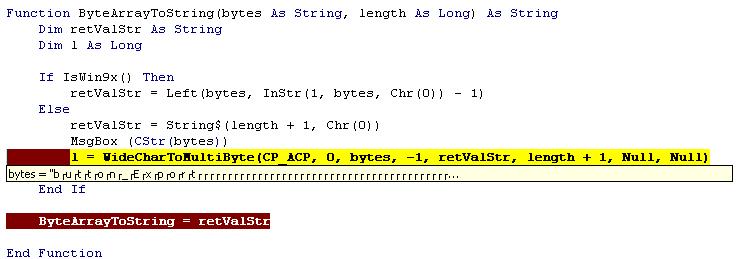Wie String aus der Ausgabe von Readprocessmemory erhalten
-
08-07-2019 - |
Frage
Dies ist ein Ausschnitt aus meinem Code.
Declare Function ReadProcessMemory Lib "kernel32" _
(ByVal hProcess As Long, _
ByVal lpBaseAddress As Long, _
lpBuffer As Any, _
ByVal nSize As Long, _
lpNumberOfBytesRead As Long) As Long
Dim bytearray As String * 65526
Dim GetWindowsFormsID
ReadProcessMemory(processHandle, bufferMem, ByVal bytearray, size, lp)
GetWindowsFormsID = ByteArrayToString(bytearray, retLength)
Function ByteArrayToString(bytes As String, length As Long) As String
Dim retValStr As String
Dim l As Long
retValStr = String$(length + 1, Chr(0))
l = WideCharToMultiByte(CP_ACP, 0, bytes, -1, retValStr, length + 1, Null, Null)
ByteArrayToString = retValStr
End Function
Ich habe '94 null‘Fehler beim WideCharToMultiByte aufrufen. Aber ich bin sicher, dass Bytes ist nicht leer.

Ist dies der genaue Ablauf dieser Ausgabe in String zu konvertieren?
Lösung
OK, das ist gelöst (und auch diese Frage ) . Das Problem ist eigentlich WideChar Zeichenfolge in ANSI-Zeichenfolge konvertieren. Ich benutze Copymemory statt WideCharToMultiByte.
Public Declare Sub CopyMemory Lib "kernel32" Alias "RtlMoveMemory" (Destination As Any, Source As Any, ByVal Length As Long)
Function ByteArrayToString(bytes As String, Length As Long) As String
Dim retValStr As String
retValStr = String(Length - 1, Chr$(0))
CopyMemory ByVal StrPtr(retValStr), ByVal bytes, Length * 2
ByteArrayToString = retValStr
End Function
Lizenziert unter: CC-BY-SA mit Zuschreibung
Nicht verbunden mit StackOverflow